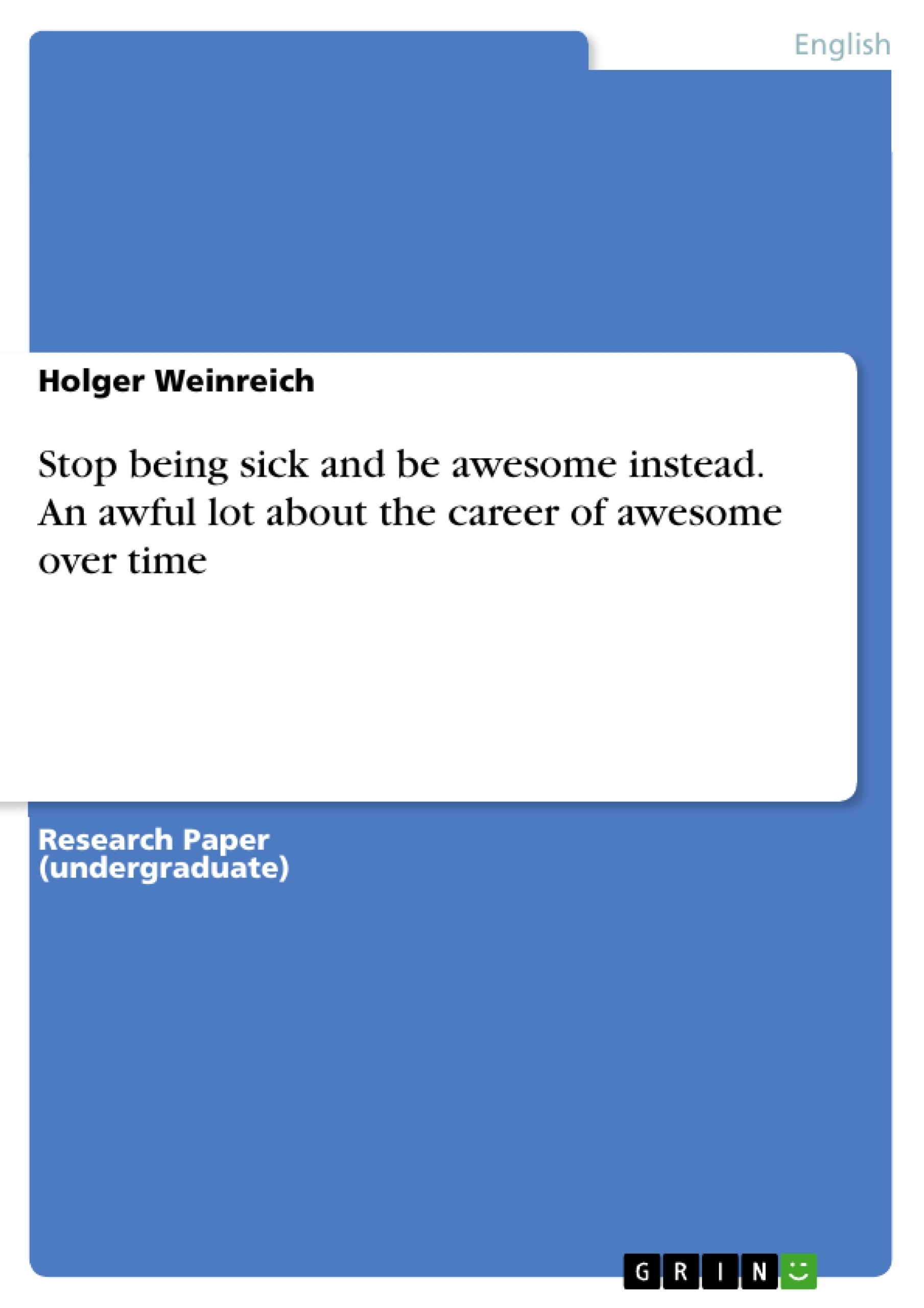The first sentence of the title of this term paper - an abbreviated excerpt from a hallmark expression by the actor Neil Patrick Harris from the US American TV-series How I met your mother – hints towards the different perceptions of the adjective “awesome” that can be found in the English language. However, the same holds true for the adjective “awful” which results in the fact that there still are contrasting concepts of both adjectives within the English speaking community and therefore also the possible audience of this term paper. The goal of this term paper is to show that there is a connection between the change in meaning of the two adjectives whose conceptualization both changed somewhere in the mid-20th century.
For an explanation of the change, Rudi Keller’s theory of an Invisible Hand in linguistics is used. Keller’s theory was chosen for this analysis as it has received significant attention since its publication in 1990 and proven useful in explaining various phenomena of language change. In addition to that, the change in meaning for both “awful” and “awesome” happened in a rather short period of time. It therefore qualifies for an explanation that put language change on the basis of a set of similar individual circumstances, just as Keller does with his idea of phenomena of a third kind.
Firstly, the paper gives an introduction into Keller’s ideas, introduces the theoretical framework and also presents critical receptions of the Invisible Hand Theory. Secondly, the development of “awesome” and “awful” over time is presented and an explanation for a possible connection is given. This is done with the help of data Google n-gram and the Corpus of Contemporary American English as well as information from both the Oxford English Dictionary and the Merriam-Webster Dictionary. In the last part, this paper applies the theory of an Invisible Hand on the language change for “awesome” and “awful” by using three categories that were developed by Christa Dürscheid. The last part also answers questions about individual motives for actions that facilitate language change, explains a possible selection process as well as gives a definition for the newly emerged structure of this particular part of the English language.
Inhaltsverzeichnis (Table of Contents)
- INTRODUCTION
- INVISIBLE HAND THEORY IN LINGUISTICS
- PHENOMENA OF A THIRD KIND
- APPLICATION ON LINGUISTICS
- CRITIQUE ON KELLER'S APPROACH
- THE DEVELOPMENT OF “AWESOME” OVER TIME
- THE DEVELOPMENT OF “AWFUL” OVER TIME
- AWESOME CONNECTION OR AWFULLY INTERTWINED?
- AN EXPLANATION WITH THE HELP OF THE INVISIBLE HAND
- CONCLUSION AND OUTLOOK
Zielsetzung und Themenschwerpunkte (Objectives and Key Themes)
This term paper explores the changing perceptions of the adjectives “awesome” and “awful” in the English language. Its aim is to demonstrate a connection between their semantic shifts, both of which occurred around the mid-20th century. The paper employs Rudi Keller's theory of an Invisible Hand in linguistics to explain this phenomenon. The theory, widely accepted since its publication in 1990, posits that language change arises from a set of individual actions, creating a "third kind" of phenomena that emerge without conscious intention.
- The development of "awesome" and "awful" over time.
- The connection between the semantic shifts of "awesome" and "awful".
- The application of the Invisible Hand theory to explain language change.
- Keller's theory of phenomena of a third kind.
- The role of individual actions in shaping language change.
Zusammenfassung der Kapitel (Chapter Summaries)
- Introduction: This chapter introduces the topic of the paper and its aim: to explore the changing meanings of "awesome" and "awful" and to find a connection between these changes. The author mentions the use of Keller's Invisible Hand theory for this analysis.
- Invisible Hand Theory in linguistics: This chapter introduces Keller's theory of an Invisible Hand in linguistics, explaining that it postulates a third kind of phenomena that result from individual actions but lack conscious intention. The author also provides examples of phenomena of a third kind in everyday life, such as traffic jams and dirt tracks.
- Phenomena of a third kind: This section dives deeper into Keller's theory, explaining the concept of phenomena of a third kind and offering examples from everyday life. It also explores the origin of the Invisible Hand theory, tracing it back to Mandeville and Smith.
- Application on linguistics: This chapter applies the theory of an Invisible Hand to language change, arguing that language can be seen as a spontaneous order. The author explains Keller's concept of language change as evolutionary and non-teleological, emphasizing the interplay of variation and selection.
- The development of “awesome” over time: This chapter explores the historical evolution of the word "awesome," analyzing its changing meanings and uses over time.
- The development of “awful” over time: This chapter investigates the historical evolution of the word "awful," analyzing its changing meanings and uses over time.
- Awesome connection or awfully intertwined?: This chapter explores the potential connection between the semantic shifts of "awesome" and "awful," examining any possible correlations and similarities in their development.
- An explanation with the help of the Invisible Hand: This chapter applies the Invisible Hand theory to explain the observed changes in the meanings of "awesome" and "awful," analyzing the individual actions that contributed to this language change.
Schlüsselwörter (Keywords)
This term paper explores the changing meanings of "awesome" and "awful," applying Rudi Keller's Invisible Hand theory to explain this phenomenon. Key themes include language change, semantic shift, phenomena of a third kind, individual actions, and spontaneous order. The research focuses on the application of Keller's theory to analyze the historical development of these words and their potential connection.
- Quote paper
- Holger Weinreich (Author), 2016, Stop being sick and be awesome instead. An awful lot about the career of awesome over time, Munich, GRIN Verlag, https://www.grin.com/document/451334




